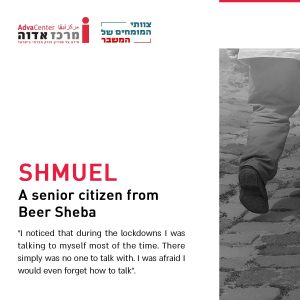The story of Shmuel, a senior citizen from Beer Sheba, reflects the huge change that occurred in the daily lives of senior citizens in Israel who were leading independent lives prior to the epidemic. The character is based on citations collected in the framework of interviews with senior citizens during the first year of the epidemic
Even before the outbreak of the Corona crisis, many senior citizens in Israel suffered from a plethora of ills, like chronic diseases, poor housing, loneliness, poverty, and food insecurity. The epidemic had a negative effect on the lives of not a few elderly persons.
The story of Shmuel, a senior citizen from Beer Sheba, reflects the huge change that occurred in the daily lives of senior citizens in Israel who were leading independent lives prior to the epidemic. The character is based on citations collected in the framework of interviews with senior citizens during the first year of the epidemic. As there are variations from place to place, the character of Shmuel was created in accordance with reference to a particular place, Beer Sheba.
Background: Shmuel is 76 years old and resides in Beer Sheba. A widower, he lives alone in an apartment he owns, in which he and his wife raised their four children. Two of the children live abroad and two in the central part of the country. He has 10 grandchildren, two of whom he is very close to.
Shmuel is now retired; for most of his life he worked as a skilled laborer. He lives on a pension of NIS 3,000 ($1,000) a month and social security in the amount of NIS 2,300 ($770) a month.
Shmuel has diabetes and is very careful about what he eats, abstaining from sugars and carbohydrates so as not to exacerbate his condition. Until the Corona outbreak, he followed a fairly strict regimen of physical activity, mainly walking to the synagogue and to a park located about 800 meters from his apartment. He was also careful to check his sugar level several times a day, in accordance with the instructions of his family doctor.
At the park and especially at the synagogue, Shmuel usually met with contemporaries with whom he conversed about current events. Those of his children who reside in Israel called him once a week and he phoned the two grandchildren with whom he is in touch quite frequently, or they called him. The sons who reside abroad contacted him mostly on holidays. Those living in Israel came to visit occasionally, and he spent Shabbat and holidays with them from time to time.
Shmuel bought his food and medications at a shopping mall to which he took the bus. He does not have a car.
What happened to Shmuel during the Corona epidemic?
Shmuel understood that he was at risk: “I know very well that at my age once a person loses some of his strength and capabilities, there is little chance of getting them back; thus, I need to be careful to preserve what I have.” This knowledge had a negative effect on his self- confidence, with the result that he just stayed put in the apartment. He neither went to the synagogue (which was closed a good part of the time anyway) and nor took walks to the park, losing opportunities for human interaction.
His children and grandchildren continued to call him on the telephone weekly, but they did not come to visit him during the lockdowns, and if truth be told – he was afraid that if they visited, he might contract the virus. He felt neglected and experienced a terrible loneliness: “Deep inside, I felt abandoned, left alone; I was terribly afraid and angry at everyone.”[1]
Shmuel could no longer go to the supermarket where he usually bought the goods he needed, because the buses were not running, and when public transportation did resume, he was afraid to get on a bus: “I was afraid I wouldn’t have anything to eat, or that my supply of medications would run out and I wouldn’t be able to get more from my HMO.” Following a request from his children, volunteers brought Shmuel both food and medications. Often the foods were not those to which Shmuel was accustomed; they were rich in carbohydrates. The quality of his diet decreased. Moreover, he no longer was careful to check his sugar level.
Shmuel kept up to date by watching television. When the vaccinations arrived in Israel, he managed to make an appointment and get inoculated.
Shmuel passed the time by watching sports, films and the news on television. “I noticed that during the lockdowns I was talking to myself most of the time. There simply was no one to talk with. I was afraid I would even forget how to talk.”
Shmuel’s physical condition deteriorated due to lack of physical activity. He also gained weight.
Fear, lack of physical activity and a terrible loneliness had a deleterious effect on Shmuel’s mental health as well. “I spent a lot of time near the window looking sadly outside and feeling anxious; I felt that I was slowly emptying out. It was very painful and very frightening. I didn’t know that human contact was so necessary and vital. Until the Corona, I didn’t realize that my children and grandchildren were so important to me.”
What happened to Shmuel after the third outbreak of Corona?
Shmuel’s children and grandchildren resumed their visits to him in Beer Sheba; however, the resumption of human contact did not suffice to significantly improve Shmuel’s low spirits, and the self-confidence he had felt prior to the Corona outbreak did not return. “I can’t seem to get back to myself; my body and spirit are upended and I can’t seem to put them back in order. I felt deserted and abandoned. I asked myself many times if I would ever be like I was, if I would ever be myself again, and if those questions had any meaning to anyone else.”
Shmuel once again began to frequent the synagogue and the park and to talk with his age mates on this, that, and the other. However, the fear and feeling of isolation remained. Some of his acquaintances had died during the past year without Shmuel being able to give them a decent farewell. His children tried to get him an appointment with a psychologist in the public health system but failed due to the long waiting list.
Shmuel began taking the bus again to buy groceries and medications, but he was fearful during those trips. His diabetes worsened; his condition was no longer balanced.
Shmuel’s children stated wistfully, “Dad just isn’t the same person he was before the Corona.”
[1] Citations courtesy of Professor Samir Zoabi, member of the Welfare Team of Experts for the Corona Epidemic; the citations are from interviews conducted in the framework of a study of senior citizens.






